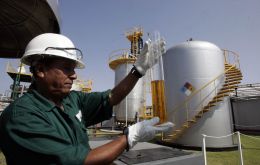MercoPress. South Atlantic News Agency
Energy & Oil
-
Friday, February 1st 2019 - 11:08 UTC
Argentina and EU reach an agreement over exports of biodiesel

Argentina and the European Union (EU) reached an agreement to end a dispute over exports of biodiesel, the Argentine Ministry of Foreign Affairs said. The deal establishes price and volume limits to be announced next month, the ministry said in a statement.
-
Friday, February 1st 2019 - 10:38 UTC
Dam burst in Brazil confirms 110 deaths and 238 missing: “deadliest-ever mine disaster”

Residents devastated by a mining dam burst in Brazil that may have killed more than 300 people reacted on Thursday with indifference and in many cases anger to miner Vale SA’s pledges to pay victims’ families and improve safety.
-
Thursday, January 31st 2019 - 09:25 UTC
Washington warns traders not to deal with gold or oil “stolen from the Venezuelan people”

The White House warned traders on Wednesday not to deal in Venezuelan gold or oil following its imposition of stiff sanctions aimed at forcing socialist President Nicolas Maduro from power.
-
Wednesday, January 30th 2019 - 10:01 UTC
Guaidó plans to name new boards of directors at PDVSA and Citgo

The President of Venezuela’s opposition-dominated National Assembly Juan Guaido will announce new boards of directors for state oil company PDVSA and its U.S. business, Citgo, according to opposition leader sources.
-
Wednesday, January 30th 2019 - 09:14 UTC
Vale vows to cut 10% iron ore output and decommission ten dangerous sludge dams

Vale SA, the world’s largest iron ore miner, on Tuesday vowed to take as much as 10% of its ore output offline in order to decommission ten more dams like the one that burst last week, killing scores of workers and nearby residents.
-
Tuesday, January 29th 2019 - 09:03 UTC
US tightening the noose: Venezuelan oil proceeds will be withheld from Maduro's government

The US has imposed sanctions on Venezuela's state-owned oil firm PDVSA and urged the country's military to accept a peaceful transfer of power. National Security Adviser John Bolton said President Nicolás Maduro and his allies could “no longer loot the assets of the Venezuelan people”. Efforts by the opposition to unseat Mr Maduro have increased in recent days.
-
Tuesday, January 29th 2019 - 08:43 UTC
Brazilian government considering management overhaul at miner Vale SA

Brazil’s government weighed pushing for a management overhaul at miner Vale SA on Monday as grief over hundreds feared killed by a dam burst turned into anger, with prosecutors, politicians and victims’ families calling for punishment. By Monday, firefighters in the state of Minas Gerais had confirmed 65 people killed by Friday’s disaster, in which a burst tailings dam sent a torrent of sludge into the miner’s offices and the town of Brumadinho.
-
Tuesday, January 29th 2019 - 08:36 UTC
Vale's market value plunges US$ 16,4bn on Monday, following on the dam burst

Brazilian miner Vale SA’s shares plunged on Monday, wiping out nearly 62 billion reais (US$ 16.4 billion) in market value, after a tailing dam collapse on Friday killed at least 65 people and left 292 missing with slim hopes for recovery. Vale shares were down 21.5% in Sao Paulo morning trading, at 44.70 reais. The company suspended dividend payments late on Sunday.
-
Monday, January 28th 2019 - 09:18 UTC
Oil prices fall on Monday as US crude production is anticipated to increase

Oil prices fell on Monday after U.S. energy firms added rigs for the first time this year in a sign that crude production there will rise further. U.S. spot crude oil futures CLc1 were at US$ 53.37 per barrel at 0027 GMT, down 32 cents, or 0.6 percent, from their last settlement.
-
Monday, January 28th 2019 - 08:35 UTC
Brazilians furious with mining company and regulators: 58 dead confirmed and 300 missing

Grief over the hundreds of Brazilians feared lost in a mining disaster on Friday has quickly hardened into anger as victims' families and politicians say iron ore miner Vale SA and regulators have learned nothing from the recent past.
